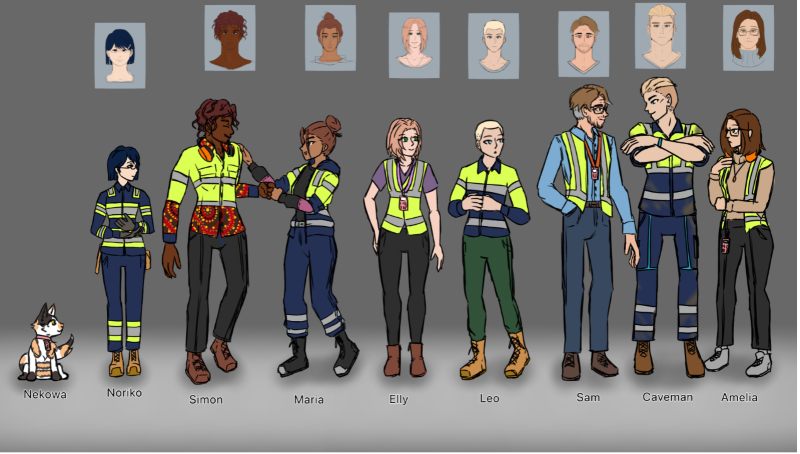A group of global aviation stakeholders has teamed up to develop an animated series designed to attract girls to aviation and MRO careers.
The group hopes the series can generate interest in aviation, tackle some of the challenges women face in the workplace and increase the proportion of women in the industry. And they are hoping for industry help to get the project off the ground.
Called “The Spanner Squad,” the series first began development two years ago at Ten Hammers, an Australia-based interactive training company that creates 3D digital environments and virtual reality for aviation technical training. Ten Hammers Director Denis Manson, who is also MRO training supervisor at Alliance Airlines, says the idea was inspired by Heather Paton, the first female apprentice at an airline at which he began his career in the 1980s.
“In the first year of our employment, I saw the airline struggle with the logistics of having Heather in the technician workforce, [with] some of the older men resentful of the ‘intrusion.’ Heather was typical of what I came to recognize in the industry as a no-nonsense and practical person who just wanted to get on with it and learn her trade,” he says. “A number of us younger folk speculated out loud that surely it would be so much easier for young women in aircraft maintenance in 10 years’ time.”
Although Manson says there has been positive change for women in MRO over the last 40 years—such as support networks, scholarships, incentives and other initiatives—he notes that women still only make up a small percentage of aviation technical roles.
With “The Spanner Squad,” Manson hopes to portray the MRO “industry of the future, where the struggles of equality and harassment have largely been won.” However, he stresses that the series wants to be inspiring without being misleading. “We don’t want young girls to be motivated to pursue an aviation technical career, then get to the industry and find it is nothing like what we have portrayed,” he says. “We will temper this with a big dose of realism. It is an airport, after all. There is no getting away from noise; there is dirt and dust and grease. There will still be vestiges of sexism in the workforce. But with more allies than enemies, the young women characters can easily turn the sexism into a parody.”

The series will center around a fictional airline and aviation maintenance hangar, featuring a range of “squad” members, including technicians of different genders at various stages in their careers and even a resident cat that lives in the hangar and can fit into small places on an aircraft to fix issues. Manson says the series will feature a diverse cast of characters, but the intent is not to “tick boxes” or to make a political statement. Rather, he stresses that representation will help young people imagine themselves in MRO careers.
The series will also illustrate technical concepts and the importance of safety in MRO. Manson says “The Spanner Squad” will include the use of emerging MRO technologies such as drone inspections and artificial intelligence, and it will also highlight non-technical competencies such as professionalism, communication, teamwork and mentoring. “The series wants to highlight the importance of aircraft maintenance and its potential as a career but dispel the myth that it is all dirty and heavy work behind the scenes,” he says. “With sophisticated testing equipment and on-board diagnostic tools, it’s not a grease monkey job anymore; it requires digital literacy and a professional, dedicated approach and mindset.”
After working with his colleagues at Ten Hammers to flesh out potential storylines and character outlines, Manson floated the idea to the Singapore chapter of Women in Aviation International. “The response was so positive that we made a more concerted effort to develop more resources and to continue our outreach into the industry, asking people if they thought it was a good idea or not. Honestly, we have been waiting for people to cut us down and say, ‘No, this is a stupid idea, and it won’t work for these reasons,’ but, so far, it hasn’t happened,” he says.
Ten Hammers created a “Spanner Squad” Advisory Board this summer comprised of 40 women and girls from all over the world who are helping to provide perspectives and shape characters, dialogue and storylines. The company has tapped interns from local technical universities to help develop character designs and promotional materials.
Manson says the Advisory Board—which is not just limited to women—is still accepting nominations. Ten Hammers is also seeking industry feedback, sponsors and partners to help advance the series’ development. “It may be too much of a wacky idea for some, but we see potential partnerships with airlines, MROs, Part 147 training colleges, defense force recruitment and even airport authorities,” he says. “There are Part 147 colleges that have specific programs to attract more female trainees, [and] ‘The Spanner Squad’ could reference these programs.”
Ten Hammers intends to apply for development funding in Australia later this year “to take this idea to the next level, which will be something marketable,” Manson says. He adds that the application will require Ten Hammers to “show evidence of potential market interest” and “widespread industry endorsement of the idea,” but that the process to acquire funding will be very competitive.
In the interim, Ten Hammers is also working to build a game version of “The Spanner Squad” to introduce characters to a broader audience and bring in some funding.
link
